Key takeaways:
- Understanding personal motivation is crucial during challenges; reflecting on one’s “why” and past achievements can reignite determination.
- Setting realistic, achievable goals and maintaining a flexible routine helps manage stress and maintain progress during tough times.
- Utilizing support systems, positive self-talk, and reflecting on past successes can significantly boost resilience and motivation.
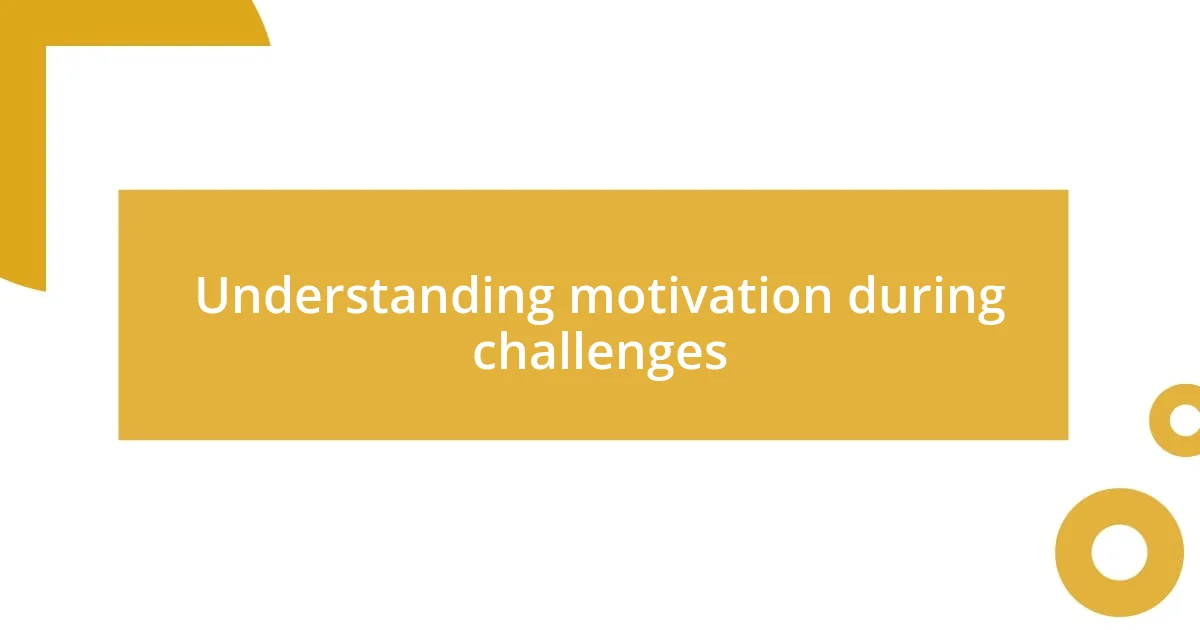
Understanding motivation during challenges
When challenges arise, I often find myself reflecting on what truly drives me. I’ve learned that motivation isn’t a constant; it ebbs and flows like the tide. During tough times, I ask myself, “What’s my ‘why’ in this situation?” This question helps me reconnect with my purpose, making the obstacles feel less daunting.
I remember a particularly challenging phase in my career when I felt overwhelmed and underappreciated. In those moments, I’d take a step back and remind myself of my goals and aspirations. It’s fascinating how calling to mind those dreams reignites a spark within me. I’ve realized that understanding my motivation during such periods transforms my mindset, turning frustration into a driving force.
Yet, it’s crucial to recognize that external factors can impact our motivation too. I often notice how my surroundings influence my mindset, whether it’s the support of friends or the negativity of a stressful environment. Have you ever thought about how much your environment shapes your motivation? It gives me insights into the kind of atmosphere I need to cultivate around me during hard times.
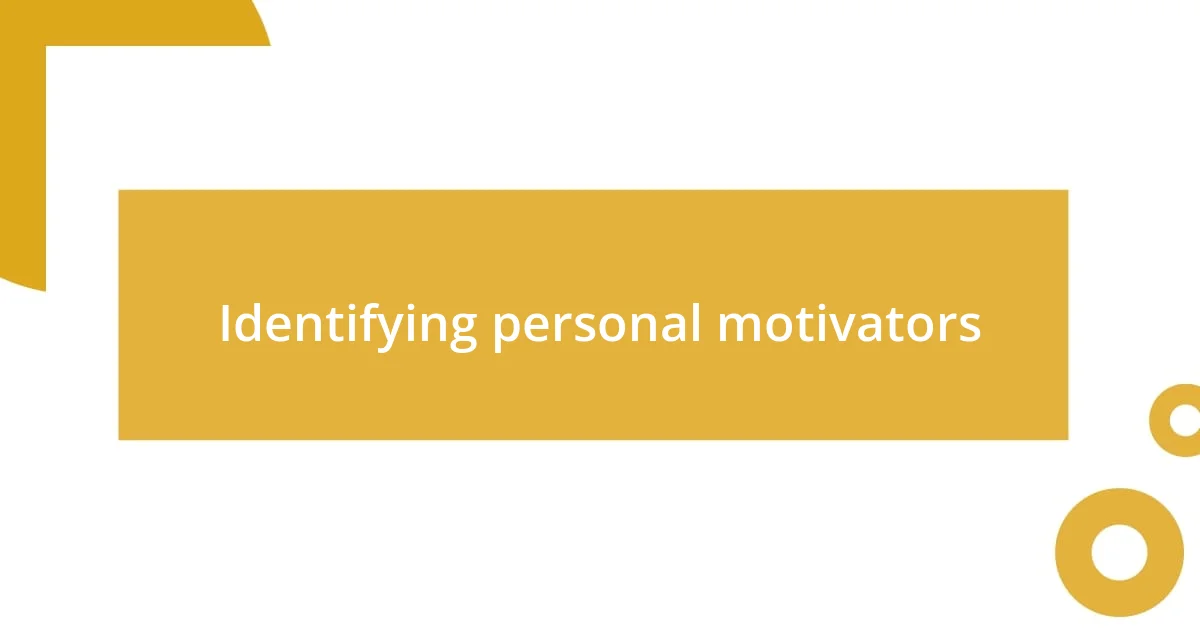
Identifying personal motivators
Identifying personal motivators is essential for navigating tough times. I find that digging deep into my experiences reveals a myriad of factors that fuel my determination. Reflecting on past successes helps me remember what I’m capable of achieving, which gives me a mental boost. For instance, during a particularly draining project, I reminded myself of the compliment a mentor once gave me about my creativity. That simple acknowledgment reignited my passion and pushed me to tackle the challenges ahead.
Consider the following aspects when identifying your personal motivators:
- Core Values: What principles guide you? For instance, I value integrity and growth, which remind me to stay authentic in my pursuits.
- Passions: What activities excite you? Whenever I lose sight of my drive, creating art or writing rekindles my enthusiasm.
- Support Systems: Who lifts you up? I lean on friends who encourage me when self-doubt creeps in, allowing their positivity to recharge my spirit.
- Past Achievements: What successes can you reflect on? Recalling a time I overcame a significant hurdle always reminds me of my resilience.
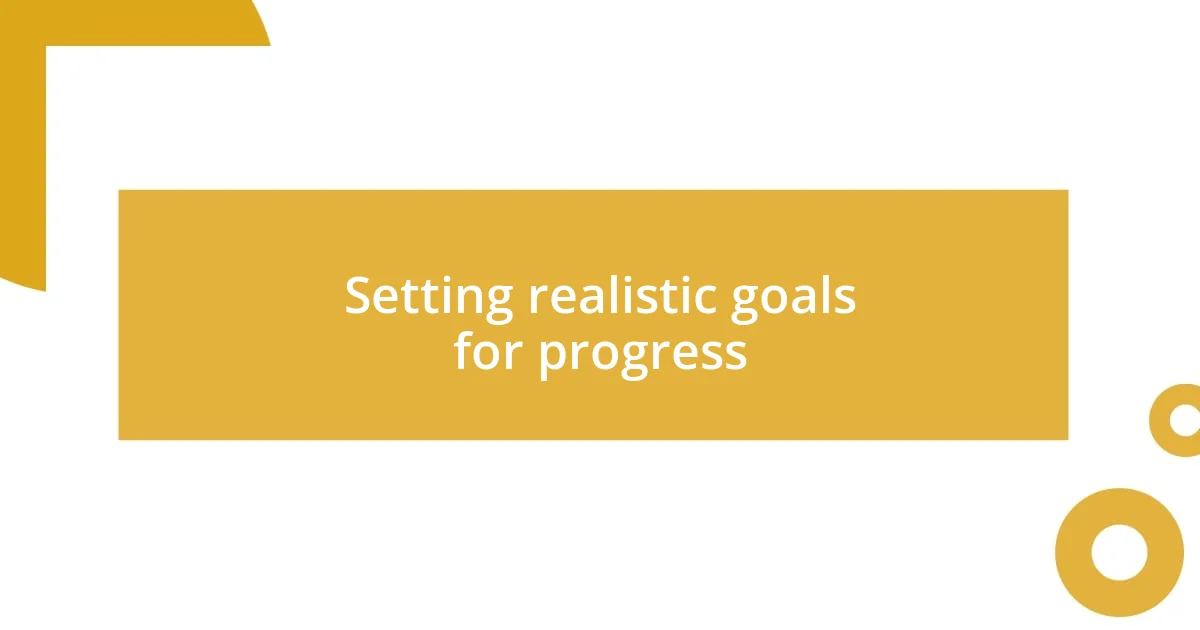
Setting realistic goals for progress
Setting realistic goals is fundamental for making progress, especially when the going gets tough. I’ve found that setting achievable goals helps me maintain momentum during challenging times. Instead of shooting for the stars right away, I break my ambitions into smaller, bite-sized tasks. For example, when I was preparing for a major presentation, I focused on completing one section of my slides each day rather than trying to finish everything in one sitting. This approach not only made the project feel less overwhelming but also allowed me to celebrate small victories along the way.
In my experience, it’s essential to align these goals with my current capabilities and resources. At times, I’ve set my sights too high and faced disappointment. Learning from those moments made me realize that progress is a marathon, not a sprint. If I wanted to read a certain number of books in a month, it was far more effective to set a goal of reading just a few pages daily rather than trying to tackle entire chapters in one go. This way, I enjoyed the process without feeling the pressure of unrealistic expectations.
Moreover, I regularly revisit and adjust my goals as needed. Life can throw curveballs, and I realize that flexibility is key. When an unexpected situation arose last year, causing a significant delay in my project timeline, I took a deep breath and reassessed my goals. I revised them to reflect my new reality, which took off the stress and allowed me to focus on steady progress. It’s all about giving myself grace and understanding that growth varies from moment to moment.
| Goal-setting Approach | Example |
|---|---|
| Initial Goal | Set a goal to finish a major project in one week. |
| Realistic Breakdown | Break it down into daily tasks, such as completing one section per day. |
| Post-reflection | Reassess when facing unexpected obstacles and adjust deadlines or tasks accordingly. |
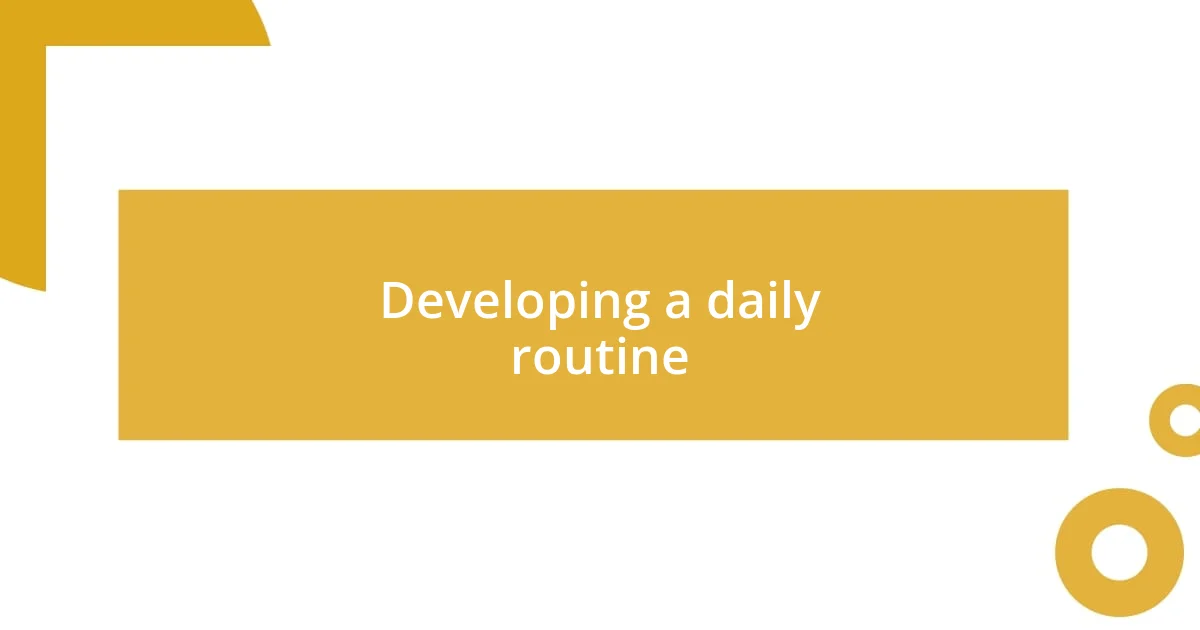
Developing a daily routine
Creating a daily routine has been a game changer for me during tough times. I remember when I was going through a particularly challenging phase, and my days felt chaotic and unproductive. So, I decided to establish a structure. By dedicating specific hours to work, exercise, and relaxation, I found a rhythm that not only kept me organized but also provided a sense of normalcy amidst the uncertainty.
One aspect I’ve embraced is the power of small rituals, like my morning coffee routine. It’s incredible how something so simple can ground my day. I pour myself a cup, sit quietly, and take a few moments to reflect. This practice not only prepares my mind for challenges ahead but also serves as a comfort that helps me look forward. Does anyone else find solace in their morning rituals? I believe those tiny moments set a positive tone for the day.
Another step I took involved layering in flexibility. While having a routine is important, I’ve learned that life doesn’t always stick to a schedule. For instance, last month, my work commitments unexpectedly heightened, and I had to shuffle my plans. Rather than stressing over the change, I adapted my routine, finding pockets of time to complete tasks. Acknowledging that fluidity in my daily plans has made me more resilient, reminding me that adaptability can coexist with structure. It’s truly about crafting a routine that embraces both discipline and spontaneity.
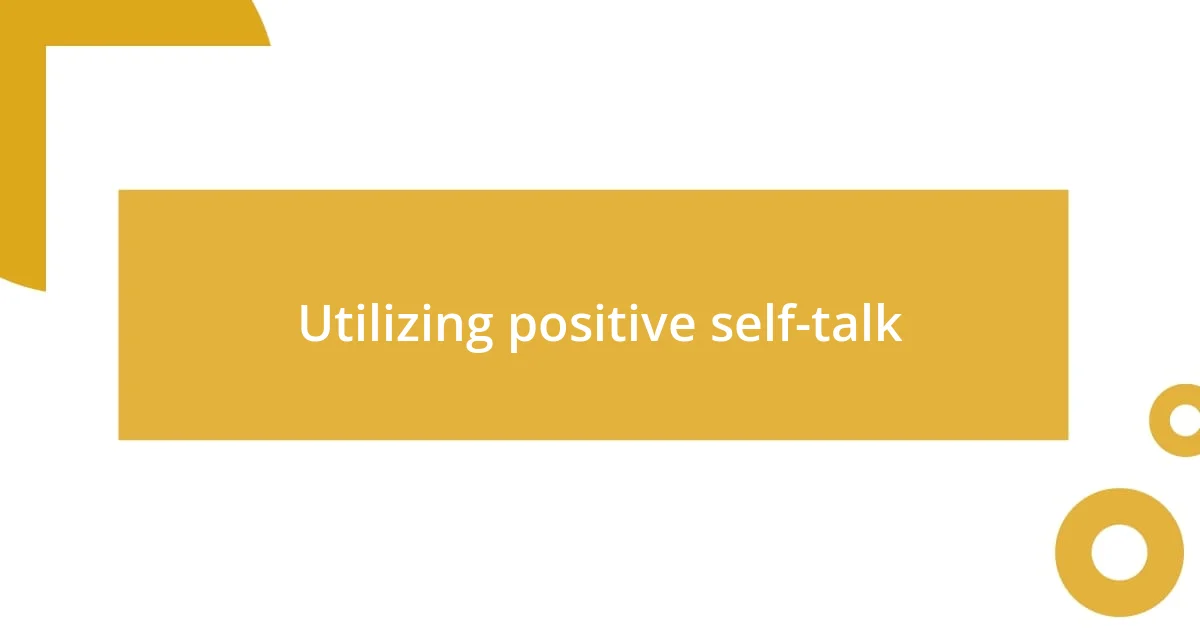
Utilizing positive self-talk
Utilizing positive self-talk has been a transformative practice for me, especially during tough times. I remember days when self-doubt crept in, telling me I wasn’t good enough to tackle the challenges ahead. In those moments, I’ve learned to challenge that inner critic. “What if I am capable?” I would ask myself, and suddenly, the weight of negativity began to lift. This simple shift in mindset opened up new pathways for motivation.
There was a time when preparing for a significant event left me feeling paralyzed by fear. Instead of wallowing in anxiety, I started reciting affirmations each morning. “I am prepared, I can handle this,” became my mantra. Over time, I noticed how reinforcing those positive thoughts made me feel more confident and less overwhelmed. Have you ever tried speaking kindly to yourself? It’s amazing how rephrasing our internal dialogue can spark a newfound sense of hope.
Moreover, I often visually remind myself of my goals and achievements through sticky notes around my workspace. Whenever I felt a wave of self-doubt hitting me hard, I’d glance at a note that read, “Remember your past victories!” This quick reminder always boosted my spirits. In tough situations, it’s crucial to have these little prompts that nudge us back towards positivity, don’t you think? Through positive self-talk, I’ve not only cultivated resilience but also created a hopeful atmosphere that empowers me to overcome obstacles.
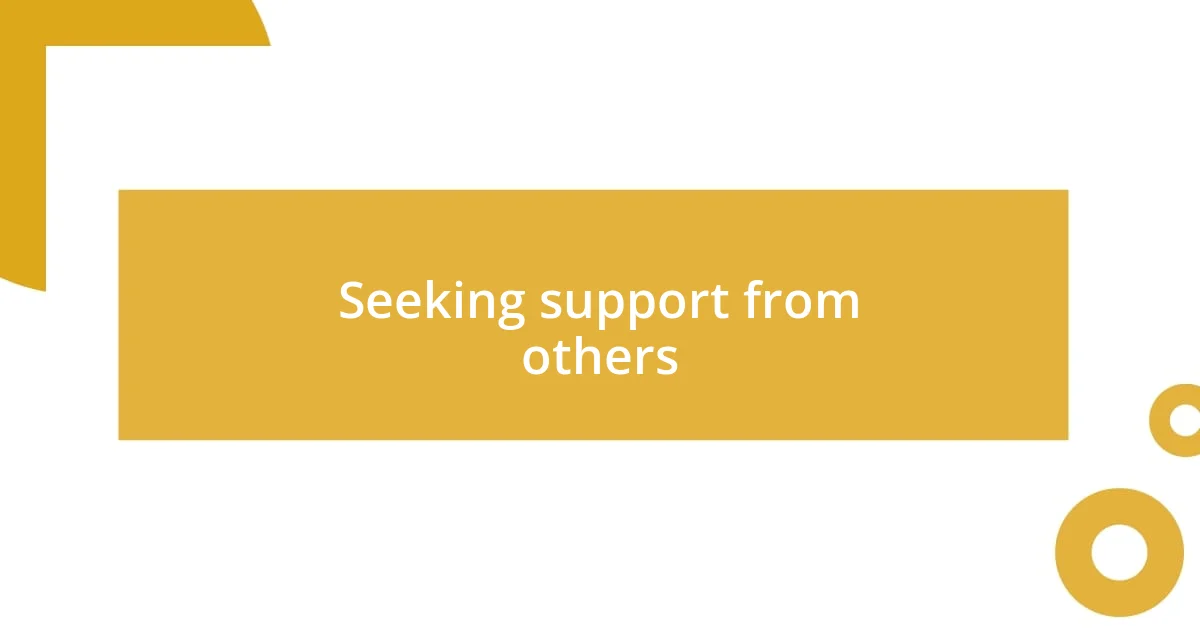
Seeking support from others
Reaching out to friends and family during tough times has always been my lifeline. I remember one particularly heavy season when I felt completely weighed down by stress. Instead of isolating myself, I turned to a close friend and shared what I was going through. Just hearing her voice and knowing I wasn’t alone gave me an instant lift. Have you ever felt that magical connection when you share your struggles with someone who truly understands?
Another avenue I found helpful was joining support groups—whether in-person or online. I stumbled upon a community of like-minded individuals who were navigating similar challenges, and it was eye-opening to share experiences. Listening to others and seeing how they cope often sparked new ideas in my own approach. It’s fascinating how the collective strength of a group can amplify our personal resilience, don’t you think?
Even small gestures can have a massive impact; I often engage in casual catch-ups over coffee where we touch upon life’s challenges. I recall one such meet-up where, simply by discussing our daily struggles, I gained new perspectives on my own issues. It reinforced my belief that vulnerability is a shared experience. Asking for help doesn’t show weakness; it showcases strength and connection, which are vital during life’s tough patches.
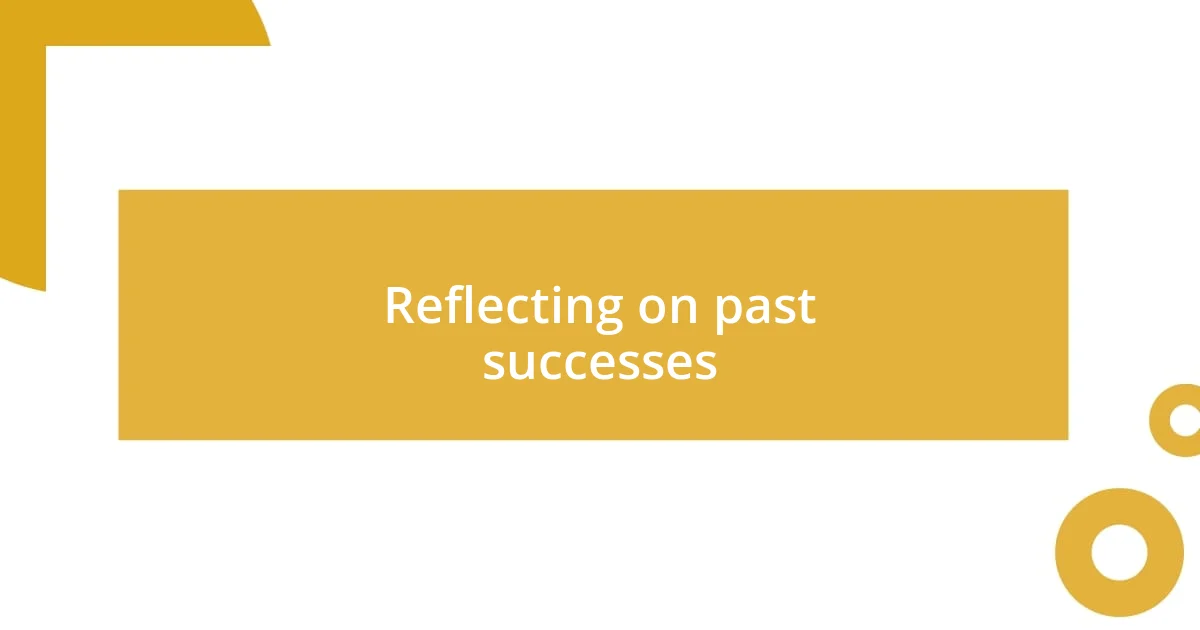
Reflecting on past successes
Reflecting on past successes has always been a vital part of my motivation toolkit, especially in challenging times. I distinctly remember a moment when I faced a daunting project at work that seemed insurmountable. Instead of letting the fear of failure take hold, I looked back at a previous project where I successfully navigated through obstacles and delivered results ahead of schedule. That memory didn’t just provide comfort; it fueled my drive to push forward.
One of my favorite ways to tap into this reflection is through journaling. There are days when I’ll flip through my old journals, and it never fails to impress me how far I’ve come. In those pages, I see records of small victories, such as completing a tough course or receiving positive feedback from my boss. Each note serves as a powerful reminder that I’ve faced adversity before and triumphed. Have you ever looked back at your own journey and felt a surge of pride for what you’ve accomplished? It’s incredible how a little nostalgia can ignite determination.
I’ve even created a “success wall” in my home office, where I display certificates, thank-you notes, and photos of achievements. Whenever I feel the urge to doubt myself, I glance at that wall and feel an instant shift in my mindset. It’s as if those tangible reminders whisper, “You’ve done amazing things before; you can do this too!” Reflecting on past successes helps me embrace a growth mindset, allowing me to see every challenge as an opportunity rather than a setback.














